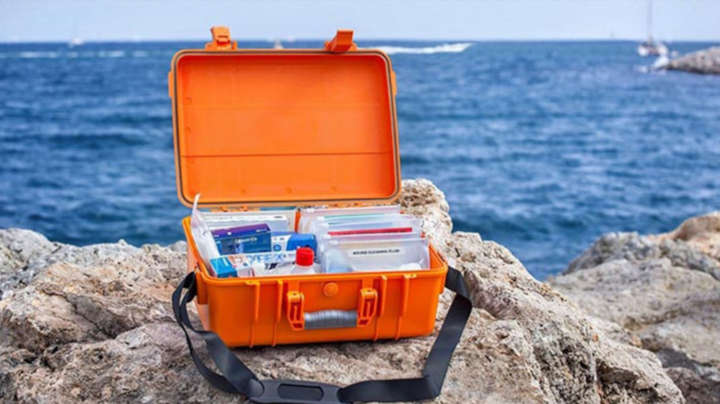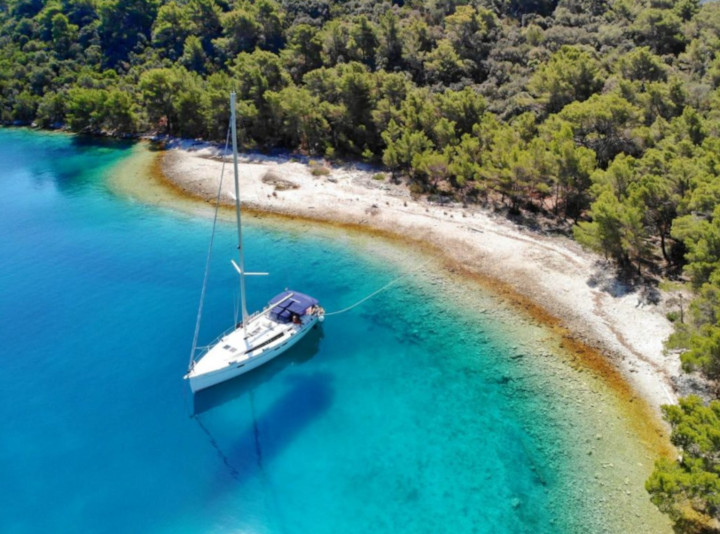An on-board pharmacy with basic medical equipment, which is designed for the special situation at sea, is part of every trip. The first-aid equipment from bandages that you know from the car is also part of it, but the onboard pharmacy needs a lot more. If in doubt, ask your doctor or pharmacist about medication.
Considerations in advance
The stocking of the onboard pharmacy depends, for example, on how long the trip lasts. Long-distance sailors need an onboard pharmacy with an extended need and a larger quantity so that in an emergency they can bridge the gap to the next doctor or pharmacist. Even if it is an area in which medical care is not available everywhere or concerns arise, for example with regard to hygiene, more careful precautions should be taken. The age structure also plays a role: are there children or older people on board who need different or special preparations? Younger crew members may also need regular medication.
- Time buffer: Don’t start filling the onboard pharmacy too late, some things are freely available, others you have to get a prescription beforehand. Recommended or mandatory vaccinations also require planning.
- Check an existing onboard pharmacy: If there is already an onboard pharmacy from previous trips, check the expiry dates and dispose of expired medicines. If any medicines are empty or low, refill them depending on the crew size. Look at the other medicines to see whether changes in temperature or similar have changed their consistency, smell, or color. Check the personal needs of your new crew. It is also useful to know the level of first aid knowledge.
- Needs of the crew: Talk to your fellow sailors about their individual needs before the start of the trip. If children are on board, the appropriate forms of medicine should also be available for their needs, such as suppositories or syrup.
- Special diseases in the area?: Is the area tropical or do special diseases prevail there? Your doctor or a tropical institute can provide you with information about this. If necessary, plan appropriate means, for example for malaria prophylaxis. See below for vaccinations.
- A list of important emergency numbers and emergency frequencies helps to act quickly.
What should the onboard pharmacy contain?
First aid kit:
- First aid kit (small, medium, large)
- Bandage cloths in different sizes
- fixation bandages
- wound compresses
- medical gloves
- waterproof plaster set, clip plaster
- scissors
- wound disinfectant
- clinical thermometer
- sphygmomanometer
- Cool-Heat Pads
- heat patch
- rescue blanket
- tweezers
- tongue depressor
- pupil light
- One-time injections if hygiene in the holiday destination is not trusted
- A good first aid manual is also helpful
Medications:
Check with your doctor or pharmacist for current remedies that are appropriate for your crew. These can also include prescriptions, which should be planned for in advance. Drug or preparations:
- for itching, insect bites, and sunburn (sunscreen, covering clothing, anti-mosquito spray as prevention)
- in case of seasickness (dizziness, nausea, vomiting)
- for bruises and burns, for example, due to friction (cooling sports ointment, wound gel, burn ointment)
- for inflammation and bacterial infections (wound disinfection, wound ointment/gel)
- for hay fever or allergies
- in case of pain or fever (headache, fever, body aches)
- gastrointestinal (vomiting, diarrhea, or constipation)
- Eye, ENT preparations, and respiratory tract (expectorant, nasal spray, earplugs, conjunctivitis, stye, sore throat)
- in cardiovascular problems
- in influenza infections
Storage of the onboard pharmacy
The onboard pharmacy should be stowed in a watertight container that ideally still floats when filled. A cool place should be found, especially on warm cruise destinations, for example on the ship’s side or below the waterline. You can also store the first aid kit and the onboard pharmacy separately. Each of the fellow sailors should know the whereabouts, but they should be kept out of the reach of children. Leave the medicines in their original packaging including the package leaflet.
More precaution
Depending on the country you are traveling to, vaccination protection should also be considered. General practitioners can provide information about what is recommended or necessary depending on the holiday destination, as certain vaccinations may also be required for entry.




